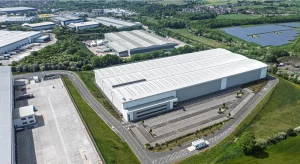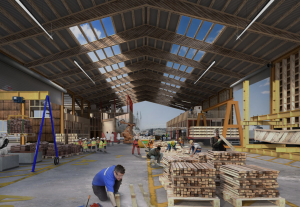
Panattoni secures full occupancy at M1 logistics park as pharma demand rises
Panattoni has achieved full occupation at Panattoni Park J28 Central M1, completing the leasing of the scheme and reinforcing the strength of demand along one of the UK’s key logistics corridors. Located with direct access to Junction 28 of the M1, the park has established itself as a prime Midlands distribution hub, offering strong connectivity to national networks. The development has attracted a diverse mix of occupiers, reflecting broad-based demand for well-located Grade A logistics space. The final unit has been let to Alloga, a specialist pharmaceutical logistics provider and part of Cencora. The deal marks the second building Panattoni has delivered to Alloga, further strengthening the park’s occupier profile. Existing tenants include Super Smart Services and a Chinese third-party logistics operator, underlining the appeal of the location to both international and specialist operators. The latest letting highlights the growing presence of pharmaceutical businesses within the logistics market. Increasing regulatory requirements, more complex temperature-controlled supply chains and the need for GDP- and GMP-compliant facilities are driving demand for highly specified warehouse space across the UK and Europe. Panattoni has responded to this shift through a series of specialist developments. In Germany, the company recently delivered a GDP- and GMP-compliant facility incorporating climate-controlled zones between 15 and 25 degrees Celsius, WGK III areas and advanced digital monitoring systems. In Poland, Grupa Olmed has taken 9,500 sq m at City Logistics Łódź VI, with the space configured to support expanding e-commerce operations through automation and mezzanine floors. Andy Preston, senior development director at Panattoni, said reaching full occupation at J28 reflects ongoing demand for sustainable, strategically located accommodation across the Midlands and nationally. He added that the M1 corridor continues to perform strongly, attracting occupiers ranging from e-commerce operators to pharmaceutical specialists. Panattoni remains active across the corridor, recently acquiring a site in Worksop for a 462,000 sq ft speculative development and a site at Northampton West with capacity for up to 1 million sq ft. Leasing agents at J28 were FHP, CBRE and APEX, with Savills advising Alloga. Building, Design & Construction Magazine | The Choice of Industry Professionals

Atis picks St James’s Park for 16th London opening at The Broadway
Atis is expanding its London estate again, with the fast-growing restaurant brand set to open its 16th site at The Broadway, the 1 million sq ft mixed-use development in St James’s Park. Founded in 2019 by Eleanor Warder and Phil Honer, Atis will take a 3,600 sq ft unit at the scheme, adding to a portfolio that already includes locations in Covent Garden, Notting Hill, Borough Yards, Mayfair and King’s Cross. The latest signing underlines the brand’s continued push into prime central London destinations with strong commuter and office footfall. Atis will join an emerging food and lifestyle line-up at The Broadway, alongside operators including Farmer J, Açaí Berry, Nostos Coffee and Nobleman Barber. The development is seeking to establish a high-quality, wellness-led retail mix that supports the needs of residents, office occupiers and visitors throughout the day. Designed by Squire & Partners, The Broadway comprises 258 homes arranged across six towers, 116,000 sq ft of office accommodation and 24,000 sq ft of street-level retail and dining space. A number of units remain available and are currently being marketed by CBRE. The deal follows the recent appointment of property developer Valouran as asset manager for The Broadway, signalling a renewed focus on curating the scheme’s commercial and retail offering. Alex Michelin, co-founder and chief executive of Valouran, said Atis is one of the capital’s fastest-growing food brands and an ideal fit for the development. He noted that the restaurant will occupy a prominent corner position with frontages onto both Broadway and Victoria Street, helping reinforce the destination’s retail appeal. Phil Honer, co-founder of Atis, said The Broadway’s location aligns strongly with the brand’s approach to simple, real food served in carefully designed spaces. He added that the team is looking forward to becoming part of the area’s continued evolution and introducing Atis to a new audience in St James’s Park. Building, Design & Construction Magazine | The Choice of Industry Professionals

Farrans lands £30m terminal expansion at Bristol Airport
Farrans has secured a £30m contract to deliver a major terminal extension at Bristol Airport, as part of the airport’s wider £400m improvement programme. Appointed as main contractor, Farrans – a subsidiary of John Sisk & Son since November 2025 – has begun work on a two-storey extension that will infill the space between the existing terminal building and the departure gates. The scheme is designed to support projected growth to 12 million passengers per year. The expansion will significantly enhance the airport’s retail and hospitality offer, with 17 additional food and retail units set to almost double the number of shops and restaurants on site. Plans also include new island retail units and expanded seating areas within the terminal. On the arrivals side, the project will introduce a new domestic baggage reclaim area featuring an additional carousel and a 20% increase in capacity. Accessibility improvements are also planned for the immigration area, with new lifts and staircases to enhance passenger flow and inclusivity. Farrans is already familiar with the airport environment, having previously completed the £60m public transport interchange in joint venture with Griffiths in July 2025. That project, which accommodates around 250 public transport movements per day, formed part of the airport’s long-term infrastructure strategy. Bristol Airport’s infrastructure director, Andrew Goodenough, said the airport has ambitious plans to transform the customer experience in the coming years. He confirmed that overall floor space will increase by nearly 45%, with a total of 38 retail and food and beverage outlets planned, including premium brands and a speakeasy-style bar. Farrans project manager Gerard McNamee said the extension will be delivered within a live operational environment, with passenger routes remaining open throughout the works. Measures such as insulated hoardings and air-locked spaces will be used to maintain passenger flow and safety. One of the more unusual logistical elements will see the use of a Bailey Bridge to transport vehicles and equipment from landside to airside. At peak, around 150 people are expected to be employed on the project, many sourced from local suppliers. Building, Design & Construction Magazine | The Choice of Industry Professionals

Blenheim Palace launches design challenge to inspire the next generation of architects as part of national Vanbrugh300 campaign
Blenheim Palace is inspiring the next generation of architects with a nationwide design competition, where winners will receive an incredible prize, including a once-in-a-lifetime opportunity to sign a roof slate and have their name in situ on Britain’s Greatest Palace for centuries to come. The Baroque masterpiece and UNESCO World Heritage Site has launched the competition for the next generation to leave their own mark on history, to coincide with Blueprints of Power, its latest exhibition, which celebrates the 300th anniversary of its architect Sir John Vanbrugh (1664–1726). The competition, announced during National Careers Week (2nd-7th March 2026), features three categories: To enter, participants must submit their response to the brief in their category via a PDF A4 visual to blenheim@cabcampaign.co.uk by Wednesday, 18th March. Entries will be judged by an esteemed panel including Sir Charles Saumarez Smith CBE, author, curator and architectural historian, Kelly O’Driscoll, Head of Built Heritage at Blenheim Palace and Donald Insall Associates Practice Director, and Edward Lewis, currently leading the restoration project at Blenheim Palace. Winners in each category will be announced Monday, 23rd March and will receive: Heather Carter, Managing Director – Visitor Attraction, Blenheim Palace, said: “This period of vital restoration has been a truly historic moment and a chance for everyone to see Blenheim Palace from a whole new perspective. Alongside the project, it’s been wonderful to witness our visitors marvel at the incredible new exhibition that highlights one of the world’s most renowned architects and brings to life a timeline showcasing the different stages of building Blenheim Palace. “We have such a rich architectural history, so this challenge is an exciting one. We can’t wait to see the submissions and do not doubt that the talented aspiring architects in the UK will create some amazing designs.” The monumental £12 million roof restoration project at Blenheim Palace began in early 2025 after a combination of age, climate change and penetration from rainfall led to the declining state of the roof, the attic timbers and ceilings below. Earlier this year, the heritage attraction launched its Sign a Slate initiative, giving the general public a once-in-a-lifetime opportunity to sign a roof slate in exchange for a donation to support the vital roof repairs, helping to preserve the Palace’s historic architecture and safeguard its heritage for future generations. Admission to the Blueprints of Power exhibition and to see the restoration in action is included with a valid day ticket or Pass to Britain’s Greatest Palace. Beyond this competition, on Wednesday 29th April from 4:30pm-7pm, the three judges will also join forces for a Panel Talk: Vanbrugh’s Hidden Blenheim at Donald Insall Associates studio in Marylebone. The panel will bridge the gap between historical archives and their on-site discoveries, assessing Vanbrugh’s legacy and the modern challenges of climate resilience and heritage conservation. For more information about the competition and the terms and conditions, visit www.blenheimpalace.com/whats-on/events/john-vanbrugh-competition/ To find out about Blenheim Palace, the major restoration efforts, the new exhibition, and to book tickets, visit www.blenheimpalace.com *Terms and conditions apply. This element of the prize will only be received by the winner of the Rising Architect (18+) category. Building, Design & Construction Magazine | The Choice of Industry Professionals

Royal Docks circular construction hub opens with ambition to lead Europe
Plans to establish what is being described as Europe’s largest circular construction hub have moved forward with the official opening of a new facility in London’s Royal Docks. Delivered in partnership with Newham Council and climate charity Tipping Point East, the hub has been created to recycle and reuse construction materials that would otherwise be sent to landfill. Once fully operational, backers say it will form the largest circular construction centre of its kind in Europe. The facility marks the first phase of a broader Circular Economy Village planned for Silvertown over the next five years. Located on Greater London Authority land, the hub is intended to support the delivery of 36,000 new homes and 55,000 jobs across the Royal Docks Enterprise Zone. One of the early beneficiaries is expected to be the Lendlease-led Silvertown development, backed by The Crown Estate, which has planning consent for 7,000 homes, at least 30% of which will be affordable. By capturing materials from construction and demolition projects across the area, the hub aims to retain value within the local supply chain and reduce the environmental impact of new schemes. Supporters estimate that at least 950 tonnes of construction waste will be diverted from landfill over the next five years, alongside reductions in embodied carbon across developments that make use of reclaimed materials. The initiative responds to the significant environmental footprint of the construction sector. Construction accounts for around 62% of total UK waste, generating more than 100 million tonnes each year. While recycling rates are comparatively high, more than five million tonnes of construction waste still ends up in landfill annually. By embedding circular economy principles into one of London’s largest regeneration zones, the Royal Docks hub aims to demonstrate how major urban developments can reduce waste, cut carbon and support more sustainable building practices at scale. Building, Design & Construction Magazine | The Choice of Industry Professionals

Training the trainers: new programme launch aims to strengthen green construction skills pipeline
FE tutors at Barnsley College’s Clean Energy Training Centre for retrofit training with Efficiency North and BE-ST. A NATIONAL training programme designed to upskill construction educators in retrofit and sustainable building and address the sector’s skill shortage has been brought to England for the first time by leading social housing consortium Efficiency North. Built Environment – Smarter Transformation (BE-ST), host of both Scotland’s National Retrofit Centre and the Mass Timber Centre of Excellence, delivered the training for Efficiency North in February, building on its two years of development and delivery of the programme across Scotland. The programme was aimed at further education (FE) sector tutors and managers from six colleges across Yorkshire and the Humber and took the form of a four-day course at Barnsley College’s newly-opened Clean Energy Training Centre, with enrolment later extended nationally across England. The course will support FE tutors and curriculum managers to strengthen green construction skills teaching, with a focus on building physics, retrofit, the application of digital methods of construction and modern methods of construction (MMC) to reduce skills imbalances in the sector. Simeon Perry, head of ESG at EN:Procure, the procurement specialist arm of Efficiency North, said: “With the government’s new Warm Homes Plan investing £15 billion to help upgrade up to five million homes by 2030, delivering energy-efficient retrofit at scale demands a workforce with the right skills and confidence. This is no longer an area where half measures will suffice. “By partnering with BE-ST, Efficiency North has chosen to invest at the very start of the skills pipeline, equipping educators with the expertise to prepare the next generation of retrofit-ready construction professionals and supporting colleges to meet both immediate and long-term green skills demand.” Designed as a leadership-focused course, the programme directly addressed the acknowledged shortage of skills within the FE sector. It takes a whole-house approach to retrofit, with a strong emphasis on building physics and the relationship between insulation, ventilation, moisture control and energy performance. Participants also explored how emerging digital tools, including artificial intelligence, are shaping construction delivery. One of the learners, Richard Favell, carpentry and joinery lecturer at Grantham College, said the course gave him in-depth awareness and discernment of the challenges and opportunities the sector is currently facing: “From the building physics sessions to the retrofit principles, technology in construction and exploration of new and emerging materials, I’ve come away with plenty of practical ideas and insights to apply in my work.” The programme prioritised hands-on learning, with delegates applying theory through practical activities and live demonstrations. Structured networking sessions enabled knowledge-sharing between colleges and supported the development of consistent, high-quality retrofit training across the sector. Delegates also received comprehensive resource packs to support future course delivery within their own institutions. Hanna Lundstrom, impact manager at BE-ST, said: “It has been great partnering with Efficiency North to deliver this programme in England. All attendees have brought great enthusiasm in both the practical exercises and the educator-to-educator discussions. From experience delivering the course in both Scotland and England, it is key for educators to get the time and space to identify and share resources on how to embed their learnings into the curriculum.” The Construction Industry Training Board (CITB) projects that Yorkshire and the Humber will need around 26,600 additional construction workers by 2028 to meet projected demand, with an annual average requirement of over 5,320 new recruits each year. While initially focused on the region, the programme is also open to colleges nationwide to support long-term viability and wider sector impact. The course was priced at £1,600 per delegate and is expected to generate further demand from FE colleges across England and Wales as the sector prepares to meet the growing requirement for retrofit and sustainable construction training. For more information on Efficiency North and its skills and sustainability initiatives, visit: www.efficiencynorth.org. For more information on BE-ST and its skills programmes, visit: https://www.be-st.build/skills-training. Building, Design & Construction Magazine | The Choice of Industry Professionals

